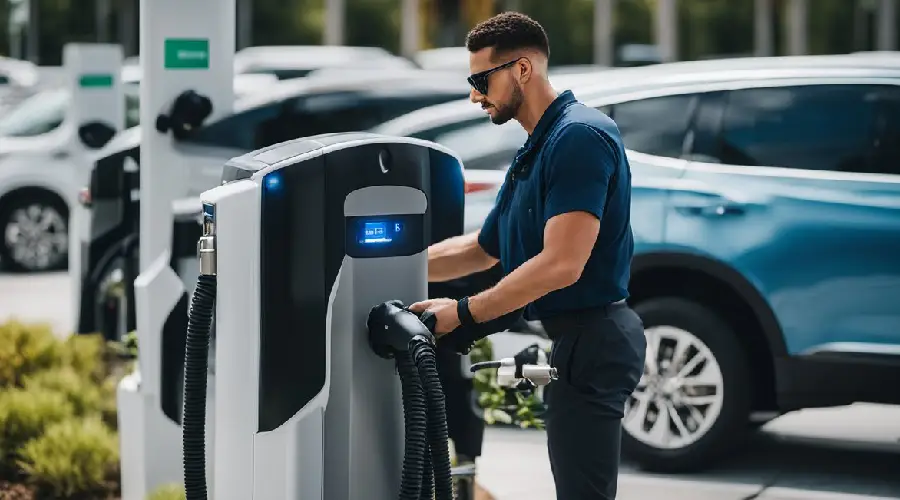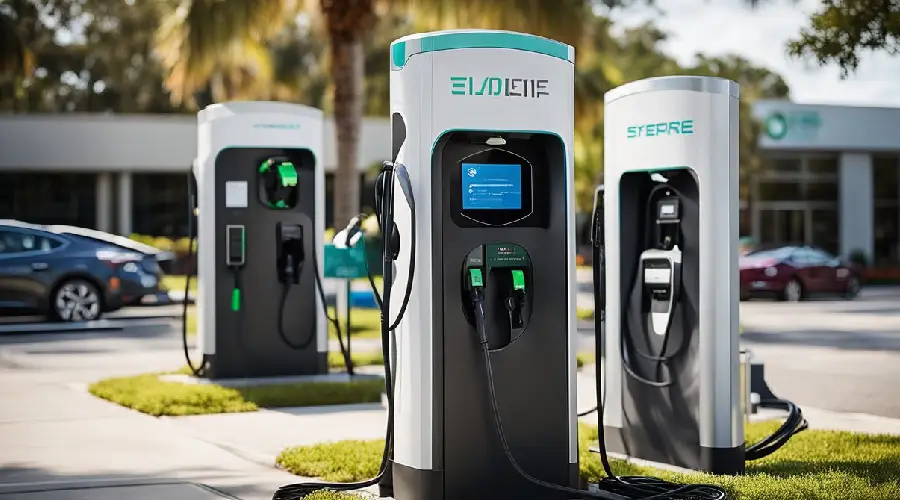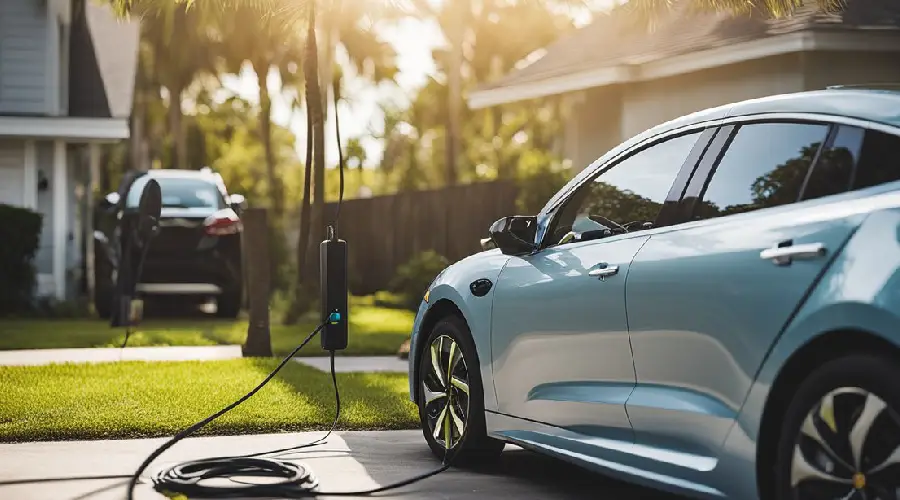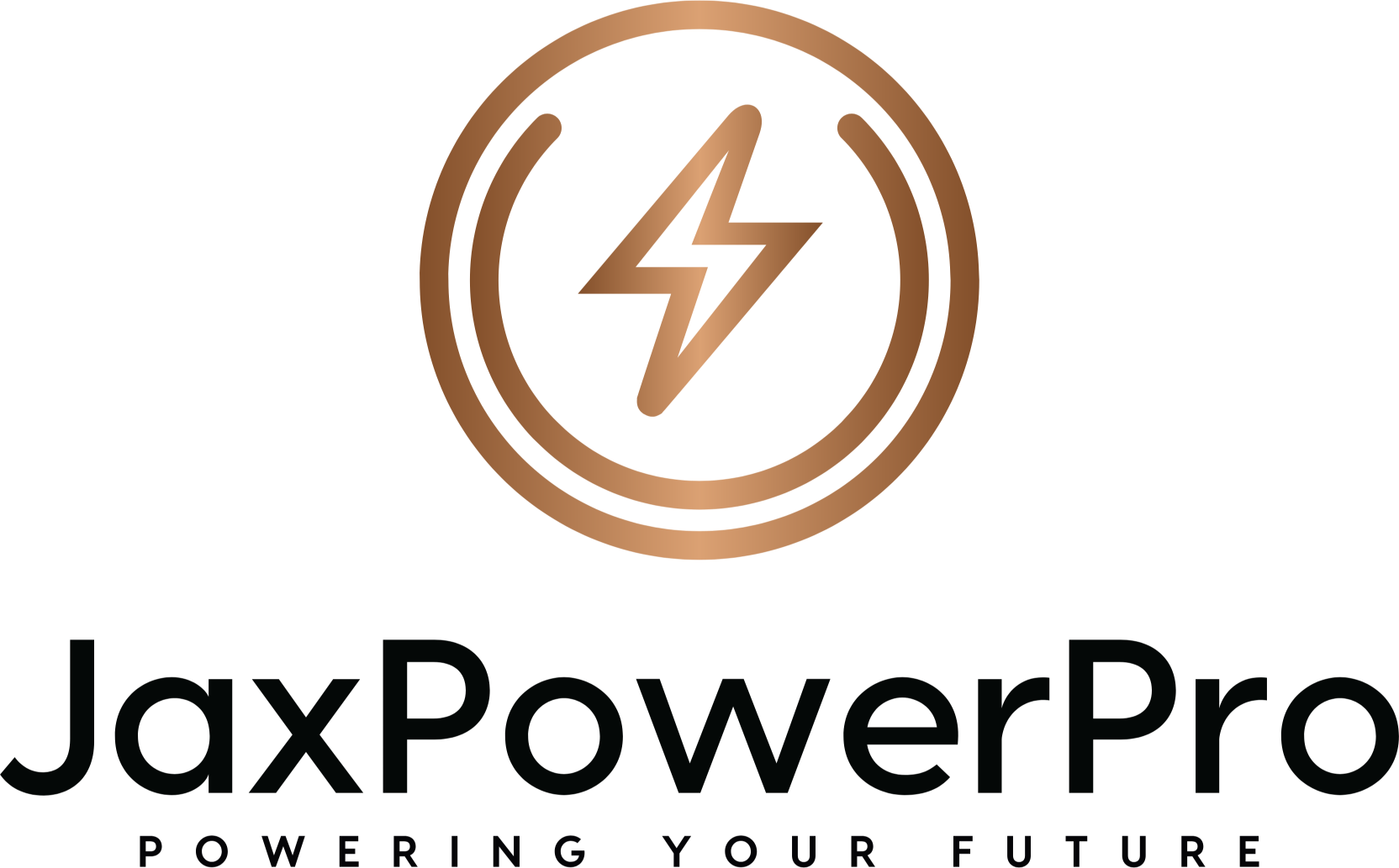As electric vehicles become more popular, many homeowners in Jacksonville, FL, are considering the benefits of installing an EV charger at home. Installing an EV charger can significantly enhance your driving experience by providing convenience and savings on fuel costs. Understanding what type of charger suits your needs, planning the installation, and knowing the available options will ensure a smooth process.
Choosing the right EV charging station for your vehicle is essential, and the installation process can vary based on your home’s electrical system. Familiarizing yourself with maintenance and troubleshooting tips will help keep your charger in optimal condition. Knowing what to expect during and after the installation can make the transition to electric driving much smoother for you.

Contact JaxPowerPro today for expert EV charger installation in Jacksonville, FL, and power up your home for the future! Call 904-689-7572 today!
Key Takeaways
- Learn about different types of EV chargers available for home use.
- Discover tips for planning the installation effectively.
- Understand maintenance practices to prolong charger life.
Understanding EV Charger Types

When considering EV charger installation, it’s essential to know the types of chargers available. Each type serves different charging needs, times, and locations, allowing you to choose the best option for your circumstances.
Level 1 Chargers
Level 1 chargers use a standard 120-volt outlet, making them the most accessible option. You can plug these directly into any household outlet, which is ideal for home use.
Charging with Level 1 can take quite some time, often between 8 to 20 hours for a full charge, depending on your vehicle and battery size. This makes them suitable for overnight charging when the vehicle is not in use.
A Level 1 charger is often included with the purchase of an EV. If you drive short distances daily, this charger type might meet your needs without significant adjustments to your routine.
Level 2 Chargers
Level 2 chargers operate on a 240-volt outlet, significantly reducing charging time. You can expect a full charge in about 4 to 8 hours. This makes them ideal for home installation or commercial sites.
These chargers require specific installation, often involving a professional electrician. Level 2 chargers can usually provide 10-60 miles of range per hour of charging, depending on the vehicle model and charger specifications.
Many public charging stations utilize Level 2 chargers, making them a popular choice for both residential and commercial setups. They enhance the convenience of charging while minimizing wait times.
DC Fast Chargers
DC Fast Chargers are the quickest option available, designed for rapid charging. They can deliver 60 to 80 miles of range in just 20 minutes or less. While primarily found at commercial stations, they can also be installed at select locations.
These chargers use direct current instead of alternating current, allowing for higher power levels. Installation requires significant electrical capacity and specialized equipment.
DC Fast Chargers are excellent for long trips or busy commercial establishments. However, they are not typically suitable for home use due to cost and electrical requirements.
Planning Your Installation

Proper planning is essential for a successful EV charger installation. Key areas to address include assessing your electrical system, identifying an optimal location, and understanding permit requirements.
Assessing Your Electrical System
Begin by evaluating your home’s electrical capacity to determine whether it can support an EV charger. Most Level 2 chargers require a dedicated circuit with a capacity of at least 30 amps.
Check your electrical panel for available capacity. If your panel is full, you may need an upgrade, which can add to installation costs.
Consider consulting a licensed electrician to conduct a load analysis. They can evaluate if your current system can handle multiple devices and suggest upgrades if needed.
Choosing the Right Location
Select a charging location that maximizes convenience and safety. Ideally, the charger should be installed near your parking area, minimizing cable reach.
Factor in the proximity to your electrical panel to reduce installation costs. A shorter distance can decrease wire material and labor expenses.
Ensure there is adequate ventilation around the charger to prevent overheating. Also, consider weather exposure; a sheltered location can enhance the charger’s longevity and performance.
Permit Requirements
In Jacksonville, regulations may require a permit for EV charger installations. Check local ordinances before installation.
A licensed electrician can help navigate these requirements, ensuring compliance. Having the proper permits also prevents potential fines or legal issues later.
Typically, obtaining a permit involves
Selecting an EV Charging Station
When choosing an EV charging station, consider its features, compatibility, and cost. These factors will help you select an option that meets your needs and fits within your budget.
Charger Features and Compatibility
Selecting an EV charger involves understanding its features. Look for charging speed, typically measured in kilowatts (kW). Level 1 chargers provide a slow charge, ideal for home use, while Level 2 chargers are faster and suitable for most home settings and public places.
Additionally, ensure compatibility with your vehicle model. Chargers often connect via specific plugs, such as J1772 for most EVs or Tesla’s proprietary connector. Some chargers also offer smart features, allowing for scheduling and monitoring through a mobile app.
Cost Considerations
Cost is a significant factor in selecting an EV charger. Pricing varies based on brand, charging speed, and additional features. On average, Level 2 chargers range from $400 to $800, excluding installation costs.
Installation prices can differ significantly, influenced by the existing electrical infrastructure. If upgrades are needed, this can increase expenses. Include potential tax credits or rebates in your calculations, as these can offset some of the costs. Always get multiple quotes from installers to find a competitive price.
The Installation Process
Understanding the installation process is crucial for a successful EV charger setup. Key aspects include hiring the right professionals, following specific installation steps, and ensuring safety inspections are completed.
Hiring a Professional Electrician
Hiring a qualified electrician is essential for EV charger installation. Look for a licensed professional experienced in installing EV chargers, especially in the Jacksonville area. Verify their credentials and ask for references.
A reputable electrician can assess your home’s electrical system to determine if upgrades are necessary. They will help you choose the right charger for your vehicle and ensure compliance with local codes. Always request a detailed estimate to understand the costs involved.
Installation Steps
The installation process usually involves several steps. First, the electrician will evaluate your existing electrical panel and capacity to support the EV charger.
Next, they will determine the optimal location for the charger, ensuring it’s easily accessible. Once the site is chosen, the electrician will run the necessary wiring and connect the charger to your electrical panel.
After installation, the electrician will test the charger to ensure it operates correctly. Finally, they will provide you with instructions on how to use the charger and troubleshoot common issues.
Safety Inspections
Conducting safety inspections is vital to ensure the installation meets all safety standards. After the installation, the electrician will perform a thorough inspection of the wiring, connections, and charger functionality.
They will check for any potential hazards such as loose connections or inadequate grounding. Post-installation, you may also want to have a third-party inspection to ensure compliance with local regulations.
Regular inspections and maintenance of the charger will help keep your system operating safely and efficiently. Being proactive about safety will contribute to a better charging experience.
Maintenance and Troubleshooting
Proper maintenance and troubleshooting are essential for ensuring the efficiency and longevity of your EV charger. Regular checks and prompt fixes can prevent costly repairs and downtime.
Routine Maintenance
To keep your EV charger in optimal condition, conduct routine maintenance every 6 to 12 months. Start by inspecting the charging cable for any signs of wear or damage. Ensure the connectors are clean and free of debris.
Check for software updates from the manufacturer. These updates can enhance functionality and security features. Test the charging speed periodically to ensure it meets the expected performance levels.
Cleaning the unit is also vital. Use a damp cloth to wipe down the exterior and remove any dust or grime. Additionally, verify that the installation location is clear of obstructions and moisture. Keeping the area well-maintained contributes to a safe charging experience.
Common Issues and Fixes
Several common issues can affect the performance of your EV charger. If the unit isn’t charging, start by checking the power supply. Ensure that the outlet is functioning and that no circuit breakers have tripped.
Sometimes, the charger may display error codes. Refer to the manufacturer’s manual to identify what each code means and the appropriate action. Resetting the charger may resolve temporary glitches.
If you experience slower charging speeds, inspect the charging cable for damage or kinks. Sometimes, the issue can stem from your vehicle’s settings or battery condition.
In cases of persistent issues, contacting a professional like JaxPowerPro can provide necessary expertise. Their team can help troubleshoot and resolve complex problems efficiently. Call 904-689-7572 for assistance.
Frequently Asked Questions
This section addresses common inquiries related to the installation of EV chargers in Jacksonville. You will find information on costs, qualifications, permits, company reputations, installation duration, and location restrictions.
What are the average installation costs for an EV charging station in Jacksonville?
The average installation cost for an EV charging station in Jacksonville typically ranges from $800 to $2,000. Factors affecting the price include the type of charger, electrical upgrades, and labor costs. You may expect additional expenses if your home requires significant electrical work.
What qualifications should an electrician have to install an EV charger in Florida?
When selecting an electrician for EV charger installation, ensure they are licensed and insured. Additionally, look for electricians with experience in EV charger installations and knowledge of local building codes. Certifications specific to EV charging system installation are also advantageous.
Are permits required for residential EV charger installations in Jacksonville, FL?
Yes, permits are generally required for residential EV charger installations in Jacksonville. You should check with the local building department to understand the specific requirements and process for obtaining the necessary permits.
Which companies provide the best reputation for EV charger installation services in Jacksonville?
In Jacksonville, JaxPowerPro is noted for its reliable EV charger installation services. Research customer reviews and testimonials to identify other reputable companies. Comparing service offerings and experiences will help you make an informed choice.
How long does the installation process of an EV charging station typically take?
The installation of an EV charging station usually takes between 4 to 8 hours. The duration may vary based on site conditions and any electrical upgrades that are required. To ensure efficiency, schedule the installation at a time convenient for both you and the contractor.
Can an EV charger be installed at any residential location in Jacksonville, or are there restrictions?
While many residential locations can accommodate an EV charger, some restrictions may apply. Considerations include available electrical capacity and local zoning regulations. It’s advisable to consult with a professional to assess your specific site and local guidelines.






